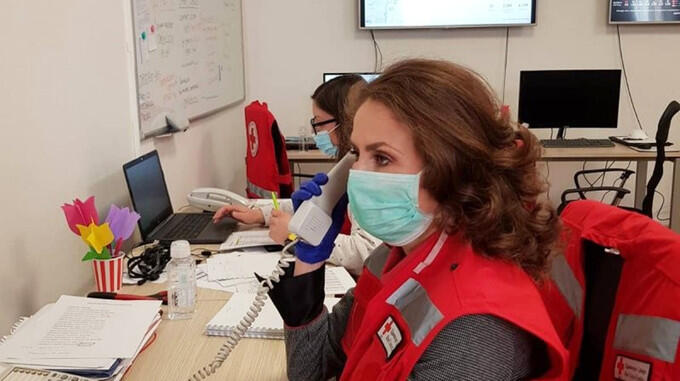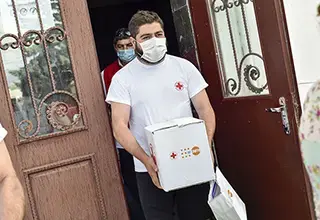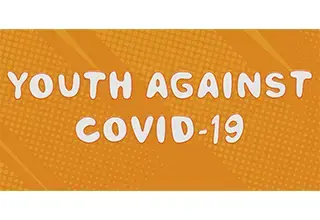BELGRADE, Serbia – Today, about six weeks after Serbia declared a state of emergency due to the COVID-19 pandemic, the country has more than 7,700 confirmed cases of the disease. The Government has called for movement restrictions to slow the transmission of the disease, with special precautions in place for older persons, who face serious risks if they fall ill with the virus.
People over age 65 in urban areas, and over age 70 in smaller cities, are prohibited from engaging in habits like morning walks, coffee with neighbours or visits with relatives. This new reality has left thousands in isolation.
“We know the psychological effects of isolation can have multiple negative effects, such as fear, nervousness, sadness and guilt,” said Natasa Todorovic of the Red Cross of Serbia.
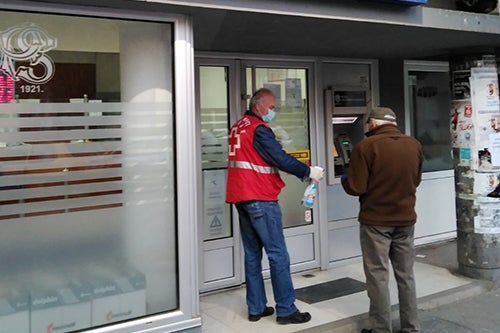
In response, UNFPA launched a helpline for older persons, which provides information, psychological first aid and psychosocial support. Older persons with specific needs – such as medicine or food – receive referrals to volunteer groups or social services that can assist. Callers can also receive legal advice.
Within hours of launching, the helpline started receiving calls, with many people looking for information, reassurance and a sympathetic ear.
“With so many stress factors that have arisen from the COVID-19 pandemic, such as fear of infection, frustration, boredom, inadequate supplies, inadequate information, stigma, financial challenges, having someone to talk to is very much needed,” Ms. Todorovic said.
COVID information targeted to those in need
“The majority of them complained about feeling lonely, even experiencing anxiety attacks, and they find separation from their children and especially their grandchildren to be the hardest,” said Brankica Jankovic, who is the Commissioner for the Protection of Equality and a volunteer at the helpline every Friday from noon to 3 p.m.
“They also ask for advice for prolonging medical prescriptions, availability of home care services, and some of them are worried about their friends with dementia who leave their homes with no knowledge that now they are breaking the law,” she added, noting that this information was shared with the Ministry of Interior.
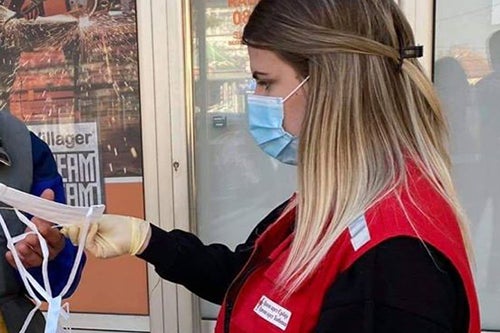
This helpline is one of several UNFPA-supported hotlines run by the Red Cross.
Other such hotlines offer psychosocial support, legal advice by the Commissioner for the Protection of Equality, advice by a professional social worker on accessing social welfare services, and psychological first aid provided in English to foreign citizens in Serbia struggle to receive such services in the Serbian language.
All these hotlines are now also providing critical information about COVID-19 and measures taken to slow its spread.
Alone, vulnerable
Older callers are reporting a variety of challenges.
Nada was one such caller. She said she is struggling to care for her adult son, who is living with a disability. “I am tired of everything in my 73 years of age… I have been fighting with my son’s cerebral palsy and autism, and now I have to fight corona. I cannot go out, stand in line, leave him alone, wait for our pension,” she said. “I am tired.”
Many others are living without family support or with little income. Obtaining essential hygiene supplies and other materials has also been a challenge due to the movement restrictions.
UNFPA is providing parcels of hygiene supplies, which will be distributed by the Red Cross, to approximately 3,000 older persons from vulnerable populations. These supplies also include information on maintaining physical and mental health, printed in a clear, easy-to-understand language design.

